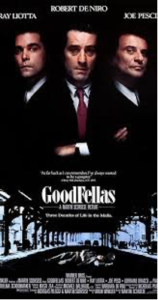
Goodfellas (1990)
Directed by Martin Scorsese
Starring Ray Liotta, Robert DeNiro, and Joe Pesci
I watched Goodfellas last night. I wasn’t sure if I was going to like it. I saw it first when it came out in 1990. It had left a strong impression on me. That was 30 years ago.
It’s left a similarly strong impression on me this time. I’m trying to figure out what that was.
It’s not a big or especially compelling story, the way, for example, The Godfather is. Goodfellas lacks the grandiosity and its plot is thinner. One cannot sympathize with the protagonist (Henry Hill, played wonderfully by Ray Liotta), the way one could with Michael Corleone (played equally masterfully by Al Pacino). The former is neither willed into action by fate or changed (as Michael is), but instead is carried along passively with the events, which are mostly out of his control. Nor is Goodfellas a depiction of the American underworld at large. Rather, it’s a film version of the life of Henry Hill, the real-life gangster on whom Wiseguys, the book by Nicholas Pileggi, and the movie were based.
The Godfather adhered to the core elements of the epic tragedy (hubris, anagnorisis, and peripeteia, to name three). Goodfellas is less ambitious and in some ways less important. It’s a docudrama, which is, by nature, a lesser form.
Nevertheless, it is a very good movie. Among gangster film enthusiasts and even discriminating critics, it’s often considered one of the best American movies made in its time.
I think what makes Goodfellas so good, and worth watching a second time, is that it accurately depicts the quotidian lives of its characters – the good times and the bad times – as ultimately mundane, and presents their crimes as they actually were. Not justified by some alternative morality, but mostly selfish, petty, and ruthless. It is, therefore, a useful emotional antidote to films like The Godfather, which, however good or great, romanticize the reality of crime.
Critical Reviews
* “Cold-eyed, breathless, brilliant.” (Vincent Canby in The New York Times)
* “What Scorsese does above all else is share his enthusiasm for the material. The film has the headlong momentum of a storyteller who knows he has a good one to share.” (Roger Ebert)
* “Is it a great movie? I don’t think so. But it’s a triumphant piece of filmmaking-journalism presented with the brio of drama.” (Pauline Kael in The New Yorker)
Interesting Facts
* Some of the dialog is brilliantly real. You feel that it must have been tape recorded from an actual conversation. Turns out, it sort of was. According to Joe Pesci, improvisation and ad-libbing came out of rehearsals where Scorsese gave the actors freedom to do whatever they wanted. He made transcripts of these sessions, took the lines he liked most, and put them into a revised script.
* Edward McDonald, who plays the prosecutor in the film that negotiates witness protection for Henry and Karen Hill, is playing himself. In real life, McDonald had this discussion with the Hills when they were considering the consequences for turning state’s evidence.
* Both of director Scorsese’s parents are in the film. His mother Catherine plays Tommy’s (Pesci’s) mother. His father Charles plays Vinnie, the prison inmate who may or may not put too many onions in the sauce.
 MarkFord
MarkFord